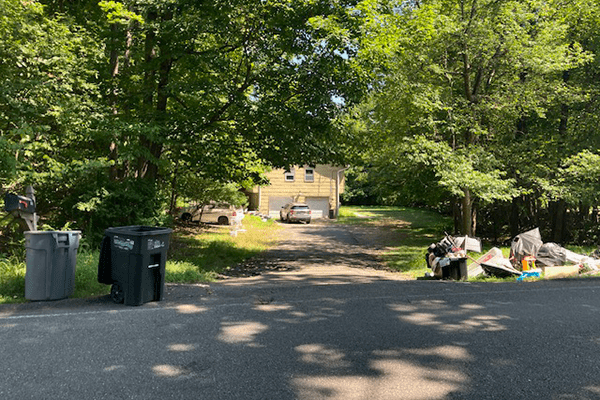|
RCBJ-Audible (Listen For Free)
|
A Trend Toward Illegally Dividing & Renting Single-Family Homes Plagues Rockland County; Municipal Governments Have Not Stemmed The Tide
By Tina Traster
At first glance, Church Road in the Village of Airmont looks like a typical leafy suburban street lined with houses dating from the early 1920s to modest mid-century cottages to raised ranches. At the southern end of the two-lane road, where Rockland County meets Mahwah, NJ, most lawns are mowed, and the homes are tidy. But as you motor north toward South Airmont Road, a pattern begins to emerge: There are several rundown houses that appear to be housing multiple tenants, potentially a violation of the village’s zoning codes.
What makes these houses conspicuous are large piles of garbage, carved up structures with multiple entrances, unkempt lawns, trucks and taxis parked overnight, and many cars parked in driveways and on lawns. These houses sag under the weight of neglect and overuse.
What’s happening along Church Road in the Village of Airmont is happening in every town and village in Rockland County. “Investors” snap up vulnerable houses, often on the cheap, and rent them to large groups. In many cases, contractors or taxi company owners will rent the house and fill them with workers, sometimes undocumented immigrants. It’s not unusual to witness what appears to be a “family” living in a house like this because neighbors see the presence of young children or bikes strewn across the property. But the parade of incoming and outgoing mattresses and other furniture gives away the ruse of converting single-family homes into unregistered boarding houses.
Like in many municipalities, Airmont’s R-35 zone permits single-family detached houses on lots of at least 35,000 square feet. The Village code allows owners to rent single-family homes, provided the house is registered on the Village Rental Registry. But rentals are limited to individuals or family units. The Airmont code defines a family as any number of persons related by blood, marriage, or adoption.
Neighbors who live near illegally converted houses are at the mercy of code enforcement officers. Airmont has one building inspector and one part-time code enforcement officer. There is little neighbors can do to cure the problem themselves, but residents can be the greatest asset to code enforcement officers. They are the eyes and ears, they have a front row seat, they know what’s going on, and they have the most to lose. When a house is converted to a boarding house, you lose a sense of continuity, safety, stability, on your street. Inevitably it will impact a neighborhood’s quality of life and home prices – when it becomes common knowledge that this kind of abuse is tolerated or goes unprosecuted by a town or village.
Neighbors along Church Road recently gathered with this reporter to discuss the declining conditions along the road. They asked not to be identified but their experience mirrors so many who are living in Rockland County and watching helplessly as “investors” buy and abuse houses in their neighborhoods. Reactions to this devolution of neighborhoods range from angry to sad to worried about the safety and well being of those who are living in the rentals.
A common experience in Airmont and in every town, residents say, is that their complaints are met with indifference and apathy. They say letters written to code enforcement officers go unanswered and public officials are simply not held accountable. Some residents believe it’s worth fighting for houses they’ve lived in for decades. Others become numb to the feeling of defeat and decide it’s easier to uproot and sell because they’re overcome with despair. In part, “investors” rely on wearing people down. Documents received by RCBJ evidence village officials issuing citations for everything from the illegal storage of vehicle on lawns, seemingly abandoned trailers, garbage and debris, and suspicions of housing having been converted to multi-family use.
The experience of living near or adjacent to a boarding house becomes triggering, a Pavlovian response because you become tuned into the noise or excessive traffic going in and out of driveways. It’s easy to feel worked up as houses languish in disrepair and you wonder what that’s doing to your real estate value – even in a bull market. Neighbors who’ve lived along a quiet street for years tend to know their neighbors – but they don’t know who’s living in these rentals. One Church Road neighbor spoke about a friend of hers who is afraid to let her teen daughter walk the dog at night.
Investors like Yoely Brach of Brooklyn, who owns 30 Church Road, owns multiple houses, according to public records. He bought the small house in 2018 for $292,500. On a recent afternoon, the lawn was strewn with garbage, the house is rundown with siding falling off the structure. Brach also owns 16 Utopian Road, 21 Utopian Road and 28 Utopian Road, which are around the corner from 30 Church Road. At 28 Utopian Road, there is a “For Rent” sign for a “room.”
The problematic cluster of homes along Church Road nearly all appear to be rentals with owners living in Monsey, Spring Valley and Brooklyn. At 32 Church Road, which, according to public records, is owned by Joel Ackerman of Monsey, there were piles of garbage, mattresses, multiple entrances and cars parked on the lawn, on a recent day. Similarly at 36 Church Road, which is owned by 36 Church Road LLC for Moshe Lavdau, according to public records, the house is rundown and there are multiple cars on a given afternoon. Neighbors say the most egregious rundown house is 44 Church Road, which was purchased by Jacob Pollak in 2018 for $325,000. Pollak also owns two houses in Spring Valley and one in Hillburn.
Village records show only 38 Church and 44 Church are listed on the village’s rental registry, and 44 Church “has 7 violations and several appearance tickets issued against it,” according to Village Attorney Brian Nugent. Several of the violations cite concern that 44 Church is being used as a multi-family house, along with a host of violations including debris, cars on lawns, unregistered vehicles, and “unsightly property.”
For a few years, neighbors were complaining about fleets of taxis, especially from a company with an “Arrive” logo coming and going and parking overnight on the lawns. However, in response to complaints, the Village in July amended its zoning code to restrict commercial vehicle parking in residential districts. The law allows only one taxi to be parked on any developed lot in the residential districts. The law permits one taxi to be parked in a garage on a residential lot and prohibits taxis from being parked or stored on any unimproved lot.
Part of the problem is that many landlords see court dates and fines as the price of doing business. Months pass before the code enforcement officer gathers enough evidence to seek a warrant to inspect the premises. Then the glacial court proceedings begin, while judges and town and village attorneys give landlords a long leash to sort out agreements. Cases can stretch for years before the landlord is brought to justice — if ever.
Residents want towns and villages to become more proactive by enlarging code enforcement staffs, securing search warrants as expeditiously as possible, engaging the community to participate in neighborhood watches, enforcing violations of rental registries, involving police detectives when possible, and using the town’s bully pulpit to telegraph that these conversions will not be tolerated. Many frustrated residents in towns across Rockland complain that code enforcement officers often visit a house during working hours when the houses are empty.
“They need to send someone at 11 pm,” one resident said.
And the last goal is only meaningful if the town has an actual record of cracking down – one that follows from indictments to the restoration of the single-family home back to a single-family home. Neighbors on Church Road say the village has been unresponsive for years. The Village, through counsel, produced records of several citations, but no court appearance, and no evidence of corrective actions of follow-up visits. Village Attorney Nugent referred RCBJ to the Airmont Village Justice Court clerk to view records related to corrective action and fines, if any were levied.












